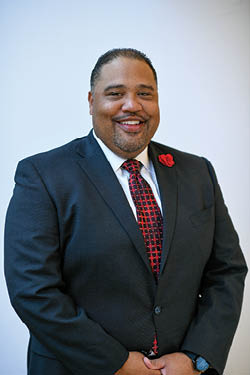NASSP News: March 2023

Meet Aaron Huff
NASSP President Aaron Huff is in his fifth year as principal of Benjamin Bosse High School in Evansville, IN. The variety of education roles Huff has held—for example, working in elementary, middle, and high schools with a wide range of demographics—has given him a well-rounded perspective on school leadership. Principal Leadership asked him about his career and his plans to advocate for school leaders at the national level.
Tell us about your background in education.
I took a nontraditional track toward leadership. I started out as an after-school program coordinator and did some basketball coaching during that time. Then I got my counseling license, became an elementary school counselor, and coached basketball and football. My first year as a counselor, I was placed in a leadership cadre that our school district established in partnership with Brown University in Providence, RI. My cadre encouraged me to sit for my principal licensure, so I took the test.
I then became a high school dean in charge of discipline. After two years in that position, I moved over to the junior high level for one year, and then I became the principal of that junior high for six years. This is my fifth year sitting in the principal seat at my current school. I was never a classroom teacher, but I displayed leadership capacity at each point in my career.
What makes your school unique?
Bosse is an urban school serving a diverse student population, and the English learner population is pretty high. I’m proud that our school really doesn’t have social cliques. You’ll see a student in fine arts and band hanging with the basketball players, and a tennis player hanging with a theater kid.
Our school has a public-private partnership with Toyota, which has created a program for juniors and seniors. Senior year, the kids are employed at Toyota part-time while still learning at Bosse, but they get paid. As soon as they graduate, they have a job opportunity at Toyota.
Did you always plan on becoming a principal?
My mother was a teacher, and I had no interest in being in education. At the end of the day, we don’t always get to determine our direction or plan; I believe there is a higher power that does that. You don’t get placed in situations where you can’t be successful.
What areas do you plan to bring attention to as NASSP president?
Increasing the voice and participation of principals of color, particularly those in urban settings. The number of principals of color doesn’t reflect who is sitting in desks in schools. Another priority is elevating the importance of establishing public and private partnerships connecting jobs and higher education to schools. I’m currently pursuing a doctorate in education, and my research is on culturally responsive school leadership. How do school districts support and develop administrators and district leaders in culturally responsive school leadership practices? It can’t just be at the building level.
I also want to focus on strengthening the collective voice of principals at all levels. We face the same challenges. The question is: How do we engage those folks who aren’t engaged? There is power in numbers.
